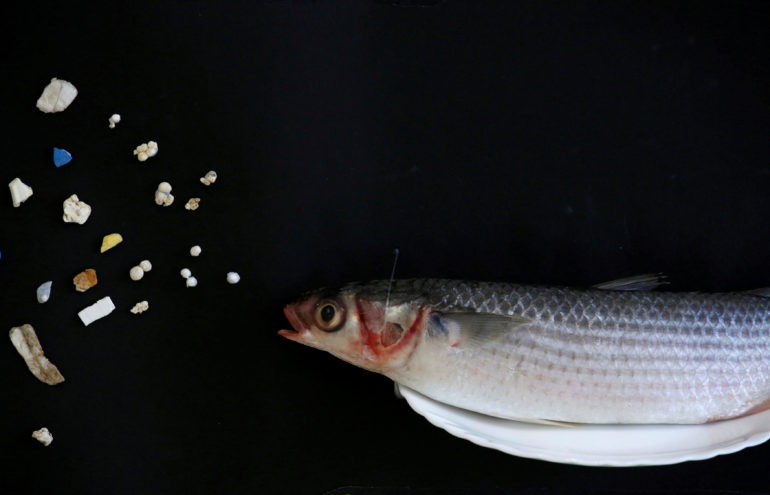
A grey mullet is shown next to microplastic found in Hong Kong waters during a Greenpeace news conference in Hong Kong, China, on April 23. (REUTERS/Bobby Yip/File Photo)
Lindsay Charlton
In an environmental and health-conscience move, most toiletries and cosmetics with microbeads have been pulled from Canadian shelves as of July 1.
The tiny plastics have been typically found in cosmetics, especially bath and body exfoliating products and toothpastes, for the past half century, according to a UN report.
The Government of Canada is committed to #BeatPlasticPollution! We are banning harmful #microplastics that pollute our waterways and oceans as of July 1st! pic.twitter.com/UwQ6SsDBnj
— Environment Canada (@environmentca) June 29, 2018
The federal government announced the ban in 2016 and labeled the tiny micoplastic pieces as toxic under the Environmental Protection Act. The ban currently in effect does not include natural products or non-prescription medications, but they will be included in the ban by on July 1, 2019.
Canada has followed the likes of the U.S., the U.K., France, Taiwan and many other countries that imposed bans on the tiny pieces of plastic.
Ashley Wallace, the water and program manager at Environmental Defence Canada, believes the ban is a good first step.
“This should help reduce some of the microplastic that we’ve been seeing in our water bodies. A study a few years ago found that there were actually more than six million bits of plastic per square kilometre in the Great Lakes,” she said. “So we know that microplastics are in fact a problem in our own backyard.”
The microbead first garnered international attention when environmental groups and advocates began raising awareness of the microplastics effect on the oceans, lakes and wildlife increasing the amount of plastic litter in the environment. The Canadian government says the small beads are not always fully removed from wastewater during treatment.
“Microbeads, I think, really became the initial poster child just because they really aren’t necessary additives to most of these products. There are other things we can be using and have historically used,” Wallace said.
She said microplastics have apparently been turning up in fish, shellfish, bottled water, tap water and people.
Wallace said that part of the reason the legislation moved forward so quickly from a few years ago is because many large companies came forward and said they were voluntarily removing microplastics from their products due public outcry. This resulted in companies switching to more natural options for exfoliants such as nutshells, salt or sugar.
The ban is quite clear that companies won’t be permitted to use biodegradable plastics as an alternative to the microbead. Companies operating in Canada and the United States will need to meet the harmonized size requirements for them, she said.
“A microbead is anything that is smaller than five mm, which is actually quite large,” Wallace said. “So anything smaller than that has now been banned in personal care products.”
While banning microbeads is a great step in addressing the issue of single use plastics, there are still more single use plastics that enter water bodies every day, she said.
“There are still a lot of other forms of plastic pollution and microplastic pollution that this ban is not covering,” Wallace said. “So while we applaud the Canadian government in making this first step, we think that more needs to be done to help get…other microplastic fragments out of our water.”

